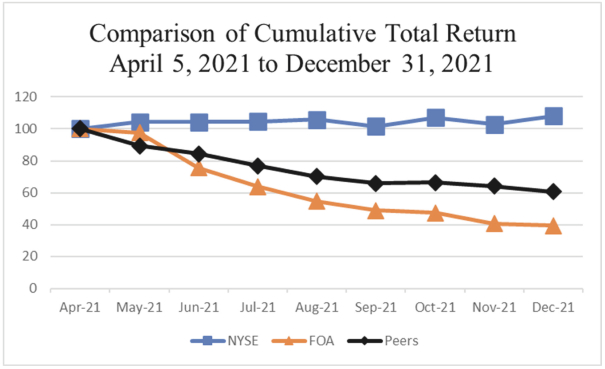of the Company. The 2019 Promissory Notes accrued interest monthly at a rate of 10.0% per annum and matured and were paid in full in June 2020. The Company paid interest of $3.1 million for the Predecessor year ended December 31, 2020 related to the 2019 Promissory Notes.
In December 2021, the Company amended the 2019 Promissory Notes with BTO Urban Holdings and Libman Family Holdings, LLC, which are deemed affiliates of the Company. Amounts under the 2019 Promissory Notes, as amended, may be re-borrowed and repaid from time to time until the related maturity date. The 2021 Promissory Notes accrue interest monthly at a rate o
f
6.5% per annum and mature in
January 2023 and were paid in full in December 2021. The company paid an immaterial amount of interest for the Successor period from April 1, 2021 to December 31, 2021. There was
no interest for the Predecessor period from January 1, 2021 to March 31, 2021.
In 2019, the Company entered into an Amended and Restated Limited Liability Company Agreement with FarmOp Capital Holdings, LLC (“FarmOps”) in which the Company acquired an equity investment in FarmOps. Subsequent to this agreement, the Company agreed to purchase originated agricultural loans from FarmOps. The Company purchased agricultural loans and had total funded draw amounts of $155.8 million and $182.4 million, respectively, for the Successor period from April 1, 2021 to December 31, 2021, and $83.0 million and $82.1 million, respectively, for the Predecessor period from January 1, 2021 to March 31, 2021. The Predecessor purchased agricultural loans which had total funded draw amounts of $146.2 million for a purchase price of $126.4 million for the year ended December 31, 2020.
The Company had promissory notes outstanding with FarmOps of $4.1 million and $0.8 million, including accrued interest, as of December 31, 2021 (Successor) and December 31, 2020 (Predecessor), respectively.
In July 2021, upon meeting the contractual exercise condition, the Company exercised its warrant for the purchase of
6,426,015 Series
A-2
Convertible Preferred Units of FarmOps at the contractual cash exercise price of $
0.0001 per unit. Following this exercise, FoA’s percentage of fully-diluted equity ownership of FarmOps is
36.4%.
In 2017 and 2019, the Company purchased preferred and common stock investments in Cloudvirga, Inc. (“Cloudvirga”). Subsequent to its investment, the Company entered into a software development arrangement in which Cloudvirga agreed to develop software in addition to providing certain technology services for the Company. In May 2021, Cloudvirga merged with an unaffiliated third party, causing the liquidation of all shares held by the Company. As such, the fair value assumptions used to determine the holding value of such preferred equity were updated by the Company and resulted in an impairment of the equity investment of $9.3 million in the Predecessor period from January 1, 2021 to March 31, 2021. As a result of this liquidation of the held shares of Cloudvirga by certain subsidiaries of the Company, the related party relationship was terminated.
For the Predecessor period from January 1, 2021 to March 31, 2021, $1.7 million was capitalized related to the development of the software and will be amortized over a 12 month period from the date placed in service. Professional fees paid to Cloudvirga, in exchange for the technology services, were $0.6 million for the Predecessor period from January 1, 2021 to March 31, 2021, $2.4 million for the Predecessor year ended December 31, 2020 and $3.0 million for the Predecessor year ended December 31, 2019.
Nonrecourse MSR Financing Liability, at Fair Value
In 2020, the Company entered into a nonrevolving facility commitment with various related parties, to sell beneficial interests in the servicing fees generated from its originated or acquired MSRs. Under these
